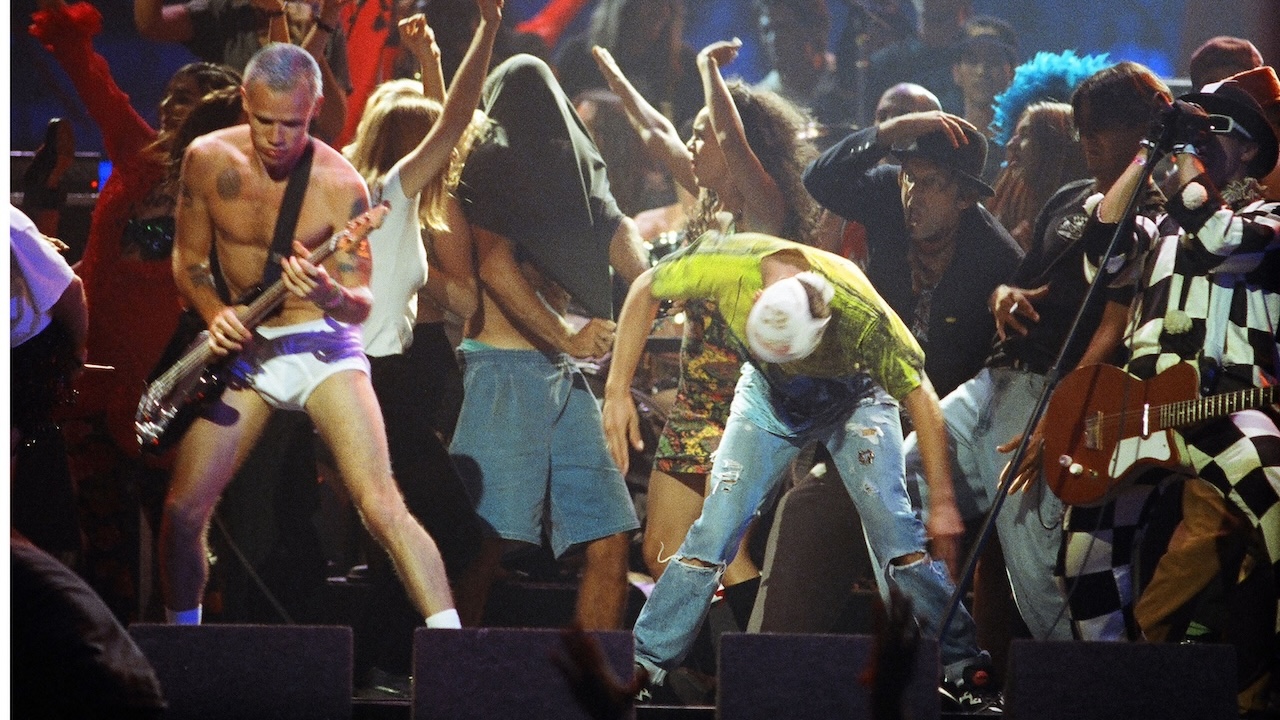“I’ve got nothing but love for John. He was brilliant back in the day… We’ve just grown apart”: Steve Jones on the Sex Pistols’ legacy, their ill-fated second guitarist auditions and how a new singer has rejuvenated the band
Original Sex Pistols Steve Jones, Glen Matlock and Paul Cook are about to kick off a rare U.S. tour with 41-year-old Frank Carter on vocals. And Jones is finally enjoying himself
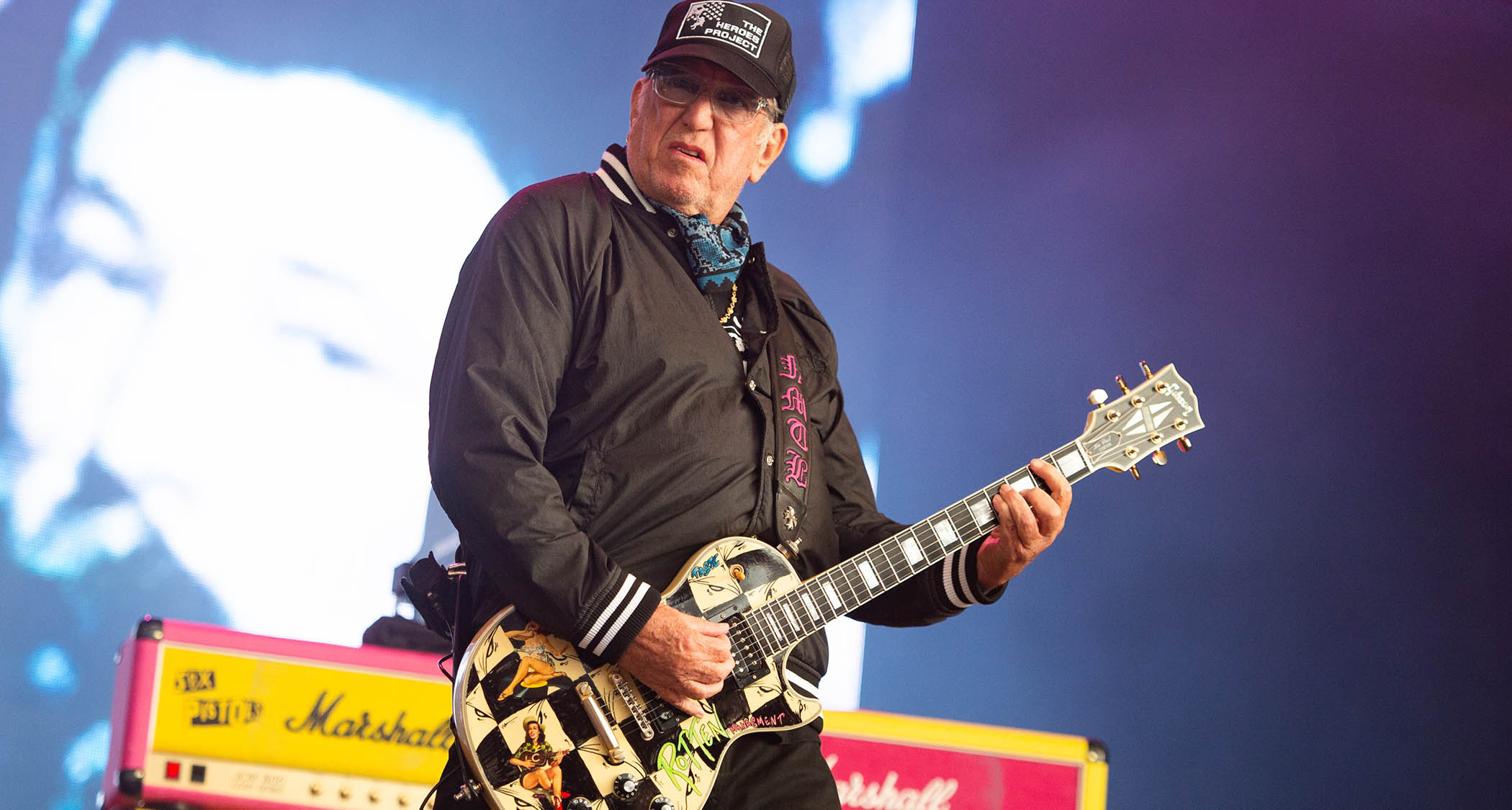
All the latest guitar news, interviews, lessons, reviews, deals and more, direct to your inbox!
You are now subscribed
Your newsletter sign-up was successful
Steve Jones has been on the road with the Sex Pistols. And like his old-guard bandmates, bassist Glen Matlock and drummer Paul Cook, he’s been reinvigorated by their vocalist, who – you might notice from our photos – isn’t John Lydon, also known as the infamous, sneering, occasionally cantankerous Johnny Rotten.
Jones says he has nothing but love for the original frontman, but also acknowledges that they’ve grown apart. Lydon, based on the poisonous darts he sometimes slings at his old pals through the media, seems to agree.
But, really, who cares? Jones certainly doesn’t, as the Sex Pistols have a range of dates planned for 2025, and the door is open for more. All of this was made possible by Frank Carter, the 41-year-old vocalist of Gallows and Frank Carter and the Rattlesnakes. But he’s definitely not doing it by channeling Lydon; he’s just being himself.
“For the first time in a long time, I’m really enjoying doing Pistols songs again,” Jones says. This was not the case when the Pistols reunited with Lydon in 1996, nor was it the case in the early to mid 2000s when they got together again.
“I was just done,” Jones says. “I was looking at my watch after two songs, thinking, ‘I’m so fucking miserable doing this.’ That was the last time we did anything with the original lineup. I was quite happy with not doing it again, but this came about with Frank, and it’s given us new life.”
![Sex Pistols circa 2025: [from left] Matlock, Carter, Jones and Cook; "I just want to get through this tour and see where we stand at the end of this," Jones says.](https://cdn.mos.cms.futurecdn.net/ShywXTZPr4UETxf4zecsqB.jpg)
It’s a life that dates back to 1975, when Jones formed the Sex Pistols alongside Matlock, Cook and guitarist Wally Nightingale. Back then, Jones was the Pistols' frontman, but that didn’t work out, leading to Lydon joining the band and Jones replacing Nightingale on guitar.
This completed the lineup that would record the infamous Spunk tapes, not to mention most of the band’s iconic debut, 1977’s Never Mind the Bollocks, Here’s the Sex Pistols. “Most” being the operative word; Matlock, aka the only seasoned musician in the Pistols, exited stage left, leading to Lydon’s pal – the non-bass-playing, but very punk-rock-looking and big-time-drug-taking malcontent Sid Vicious – replacing him.
All the latest guitar news, interviews, lessons, reviews, deals and more, direct to your inbox!
From that point on, which wasn’t very long – as the Pistols busted up after a very not-fun-looking concert in San Francisco in 1978 – the band became known for outrageous and “punk rock” behavior rather than their music. This was mostly due to Vicious, who ushered in a “look cool and worry about playing well later” mentality.
After the Pistols' run to glory ended, Jones and Cook formed the Professionals, and Lydon started Public Image Ltd. As for Vicious, he was accused of murdering his girlfriend, Nancy Spungen, in 1978; he went to jail and died of an overdose in 1979. His final words came via a suicide note, which read, “We had a death pact, and I have to keep my half of the bargain. Please bury me next to my baby. Bury me in my leather jacket, jeans, and motorcycle boots. Goodbye.”
Jones admits that Vicious’ death and the polarizing memory of Rotten’s sneering persona set to song have come to define the Pistols as much as their music has. But by no means were the Pistols musically incompetent. In fact, when observers look back on Never Mind the Bollocks, despite his greener-than-green nature, Jones’ licks stand out. Jones shrugs when reminded of this.
“I’ve never really been one to want to practice and get better,” he says. “I’m quite happy… I don’t know if I can, or if my brain will let me play anything fancy. It’s like Keith Richards. He’s great at what he does, but it’s limited. That’s fine because I’d be happy with Keith Richards’ limited guitar playing. I’d much rather be like him than Yngwie Malmsteen.” [Laughs]
People still dig the Sex Pistols. More importantly, they dig what Jones is doing on stage. He laughs at this, saying, “Why don’t you come and see us, and tell me if you think I can play guitar or not!”
Jokes aside, Jones is loving every minute of the Pistols’ resurgence. “It really is a lot of fun,” he says. “People love it. You’re going to get your naysayer, you know – whatever. But the proof is in the pudding. A lot of fans, young and old, show up. They just love it. They love singing along, and I love looking at them looking happy.
“It makes me happy, and it’s a joy to play these songs again. Otherwise, I wouldn’t be doing it. Making a few bucks is nice, but if you’re miserable… I’m 70 in [September]; I’m too old to be putting up with crap at this stage of the game.”
The Pistols have been on the road with Frank Carter out front. What led to that?
“It was all a bit of a fluke, really. Last year, we did this thing in Shepherd’s Bush [West London], and we’d talked about it because we did the Generation Sex [supergroup] with Billy Idol and Tony James, the original bass player in Generation X, in 2023. We did a lot of Generation X songs and about the same amount of Sex Pistols songs. When we were all done and dusted with that, we thought, ‘Why don’t we just do Pistols songs?’
“Billy Idol wanted to do his own thing – like he’s doing now, where he’s playing stadiums and whatnot – so we thought, ‘Who could we get as a singer?’ Glen’s son came up with Frank, but I didn’t know who Frank was. We did a Zoom meeting with Frank while I was in L.A. and he was in England, and then [the 2024 shows] came about in Shepherd’s Bush.”
That’s where you’re from, so you’ve got history there.
“Yeah, so this little club [Bush Hall] was going under, and Cookie [Paul Cook] mentioned that we could do some shows there to raise money. It sounded like the perfect way to test if something works or not. Lo and behold, it was brilliant.”
No easy feat, as Frank was filling John Lydon’s spot.
“Frank’s a lot younger, so he’s got a lot more energy. He’s literally the best; I call him the ringmaster. He loves getting the crowd going; he goes crowd surfing and just takes the heat off of me, Cookie and Glen. I’m 70, so I’m definitely not jumping into the crowd. [Laughs] He’s great – and he’s definitely not trying to be Johnny Rotten. He’s really something else, and he’s made it a lot of fun.”
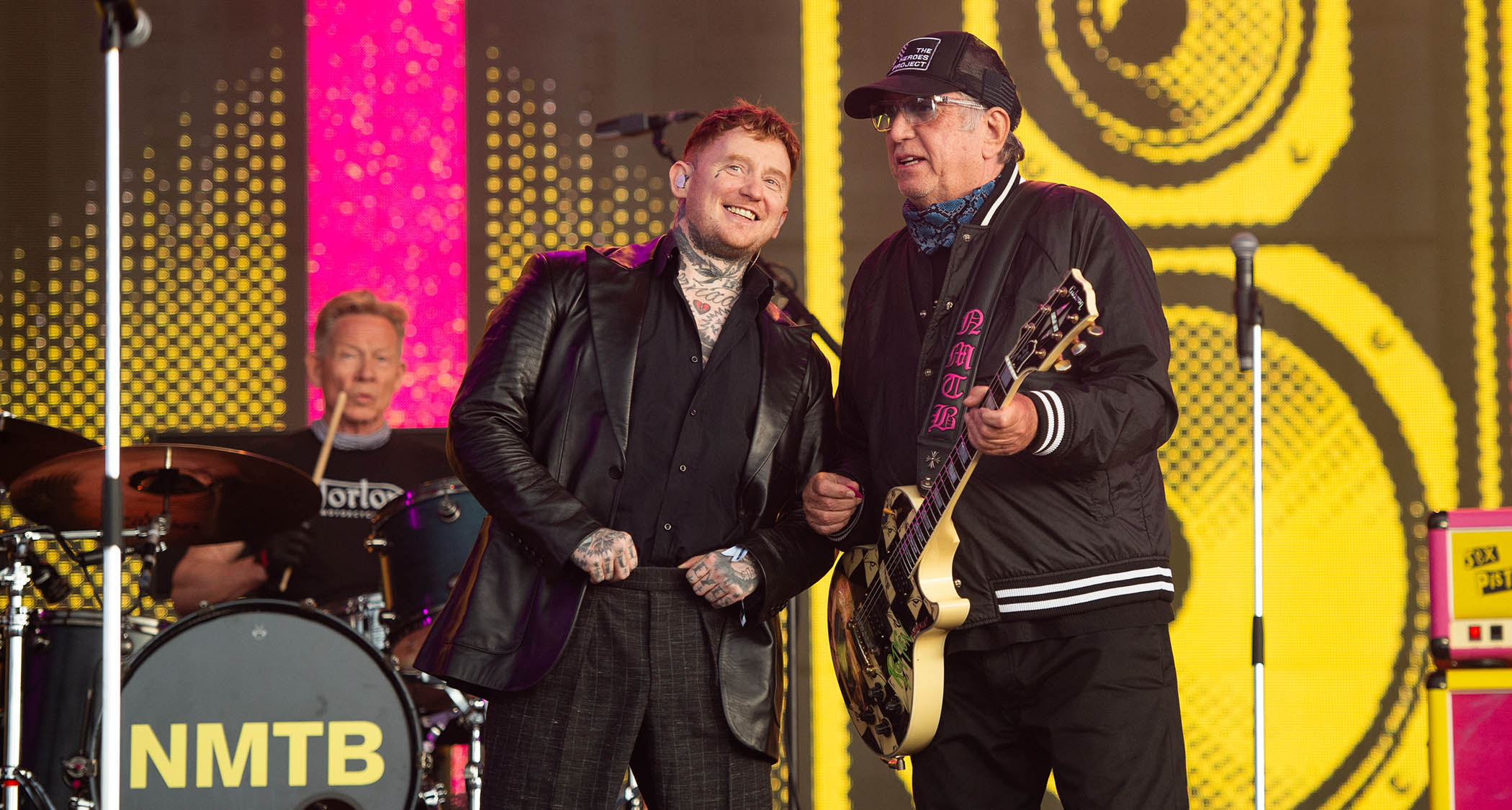
And now you have a full-scale tour planned, which also marks the 50th anniversary of when you formed the Pistols. When you started out, could you have imagined you’d be here all these years later?
“Not really. After we disbanded in San Francisco, I’d had enough. I was quite happy ending it. Then we did the reunion in ’96, and that was, like, 70-odd shows, but I wasn’t having a great time. We tried doing a few more, and I will say it was the first time I’d actually made somewhat decent cash with the Pistols.
“That was the case for all of us. Prior to that, we really didn’t make any money back in the day with Malcolm McLaren. So that was good, but then we did a few more shows in 2002 and 2003 – and then in 2007 and 2008. By the end of that, I was done.”
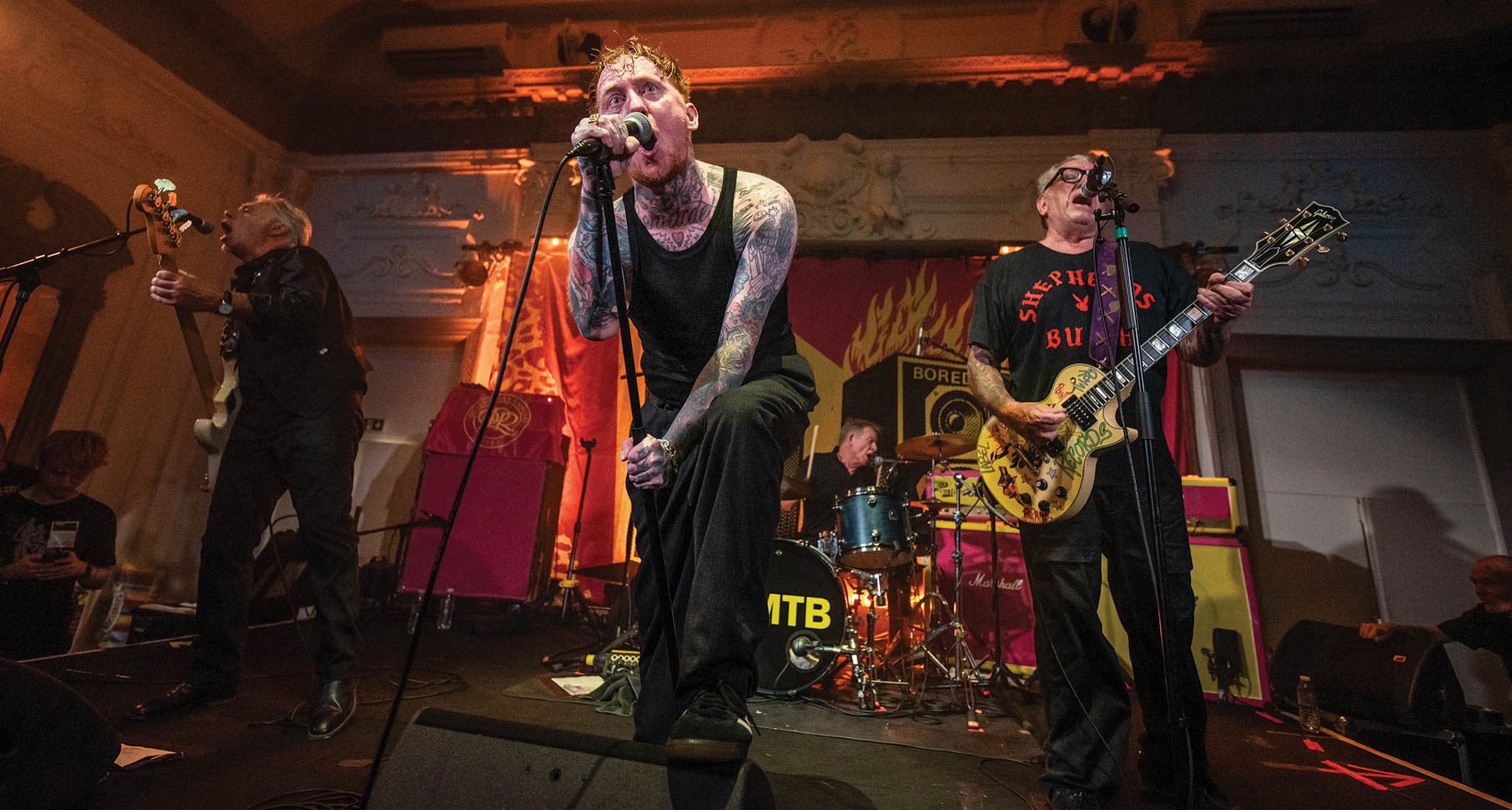
Going back to the start of the Pistols, is it true that you’d only been playing guitar for a few months when you formed the band?
“Yeah, it is true. I was basically the singer at the time before we got John. I did one silly little show, and I don’t even remember… I was so terrified because I don’t like being the front guy. And after we’d done that show, it was a disaster. I didn’t want to be the singer, and Malcolm and us talked about getting a different singer.”
Which would leave you in a more comfortable position, correct?
“Yeah, I would just come and play guitar, and that’s what we did. And then I took a load of speed – black beauties – and that kept me focused. I didn’t even really know what I was doing. I knew a couple of barre chords, and I would just play along to records, like the New York Dolls, the Stooges and glam bands like Mott the Hoople.”
Did you pick it up quickly?
“I tried to pick up how those other players were playing, and I did pick it up really quick. I wasn’t great when we first started playing; I was far from great. But by the time we did Never Mind the Bollocks, I’d been playing for about a year before we got into the studio.”
What were the writing sessions like?
“Well, we did this Spunk [bootleg], which we recorded in the rehearsal room where I used to live upstairs. We did it on reel-to-reel, and we were experimenting a lot. We had all the time in the world because it wasn’t a studio; we were just rehearsing. Before I knew it, I was picking up the guitar pretty well. But I loved it in the studio, and I loved doing the Spunk tapes.
“I love experimenting, and soon I was capable of getting away with playing eighth-note power chords and a bit of Chuck Berry. The best thing about Chuck Berry is even when you do a Chuck Berry lead, the ass doesn't fall out of the song if you’re playing the one-note lead. Plus, Chuck Berry’s leads are cool.”
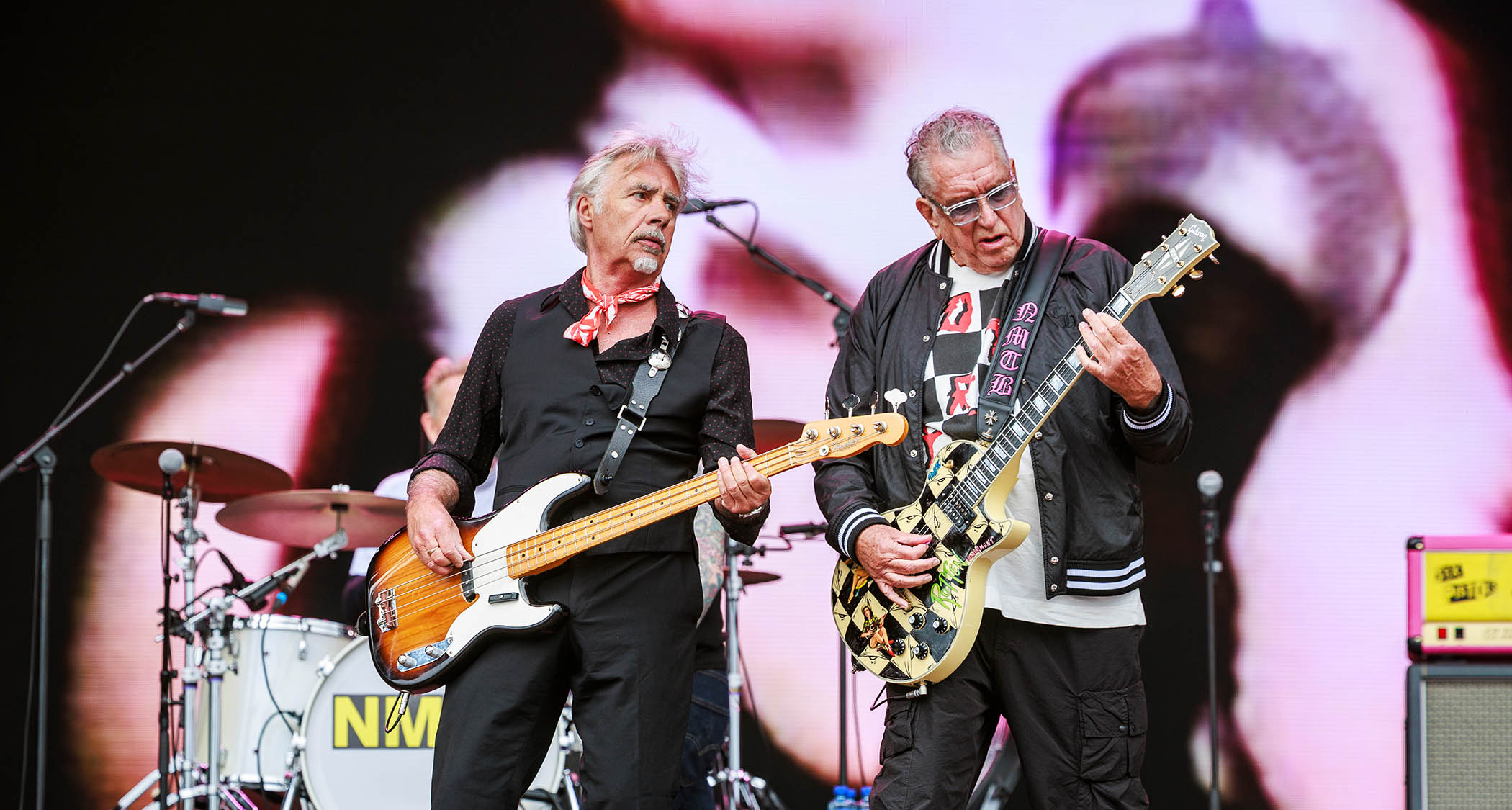
As green as you were, Bill Price, the engineer on Never Mind the Bollocks, said you were one of the tightest guitar players he’d ever worked with.
“Yeah, and I don’t mind him saying that. I appreciate it.”
We doubled both sides, you know, with the same rhythm, and then maybe add the power chords on the choruses and bits and bobs and little bits of leads
You seemed to pick up the guitar quickly to the point that Bill said there were really no overdubs needed.
“No, not a lot. We doubled both sides, you know, with the same rhythm, and then maybe add the power chords on the choruses and bits and bobs and little bits of leads here and there. It just seemed to work. I played most of the bass on the album, too.”
Did you find bass just as easy to pick up?
“Yeah. I think Bodies was probably the only song I didn’t play on. But it was all eighth notes, you know? I wasn’t doing anything like Jack Bruce, that’s for sure. [Laughs]”
With the Sex Pistols, you became known for your cream-colored Gibson Les Paul Custom. What’s the story behind that guitar?
“It was given to me by Malcolm. He got it off of Sylvain Sylvain from the New York Dolls. He was managing them at the time in New York, and then that all fell apart. I don’t know how he got it, but he brought it back from New York, and this was when I was still singing and rehearsing with the original guitar player, Wally Nightingale, and Paul and Glen.”
In a way, that guitar became the springboard for you becoming a proper guitarist – and John’s induction into the band.
“Well, Malcolm brought it back, gave it to me, and said, ‘You’ve got to stop singing, let’s get someone else.’ That’s when auditioned singers, and funnily enough, a lot of people don’t know this, but when we got John in the band, I guess I wasn’t that competent. We actually auditioned a second guitar player on Denmark Street, where I was living and we were rehearsing.”
What was that process like?
“We went through about 50 guitarists, and most of them were clowns. They didn’t know what they were doing. There were a few good ones, but they weren’t doing what we were doing, which was something new. They were more like rock guys, you know? It just didn’t work out.”
Is that what led the Pistols to stick with you as the sole guitarist?
“By the time this had gone on for about three weeks, I was playing and getting better all the time. I was really going through a crash course, though not intentionally, you know? And by the time we did our first show, it sounded like what a lot of bands wanted to sound like, which was punk rock.”
Was that the sound you were doing for, or is that what came naturally to you?
“I wasn’t trying to sound like whatever fucking punk rock was; that’s just the way I sounded because I wasn’t technically good at that point. I don’t think I’m technically good. I think I’m really good at what I do, but I never practice. I hate practicing. I would doodle around on the acoustic when I’m at home doing nothing, learning a few chords, but I don’t practice. But I’m talking about later years with that, not originally.”
Bare bones as that approach seems, it produced songs like Anarchy in the UK and God Save the Queen.
“Well, there’s a bunch of songs… we literally would sit in our rehearsal room, Glen would give me an idea, and me and Cookie would pick up on it. And John would be sitting in the corner, scribbling lyrics down on a piece of paper. And the next thing you know, we just did it. There you go. There’s God Save the Queen. Then, it was, ‘Here’s another song. Here’s Bodies, and here’s No Feelings. Here’s the whole album.’
“I’d learned some covers at first, and we did a version of a Dave Berry song called Don’t Give Me No Lip, where I would play a different riff than the riff that was on the original, which was like a blues song. And we did the Who’s Substitute and various other cover songs.
“So that’s basically what we started with. I think the first original song we had was Did You No Wrong, which we wrote with the original guitar player, and I was singing. But yeah, that was the crux of it. We’d all be in a room together, and we knocked it out pretty quick.”
Did you find that there was a sort of chemistry you can’t put your finger on when it came to being in a room with Glen, Paul and John?
“It was quite amazing. You know, John wrote amazing lyrics for a 19-year-old or however old he was – 18, 19, 20. It was just one of them lightning-in-a-bottle situations. And after we did it and broke up, we attempted messing about with writing something new in 1996, and it didn’t work out. And then we attempted something a bit later, and it just didn’t work; the magic had gone. So we didn’t pursue it.”
A big part of that chemistry seemed to come from Glen, who was the most schooled musician when the Pistols started. It must have been a big change bringing in Sid Vicious, who, to put it mildly, wasn’t a natural bass player.
“Well, there’s two different concepts. Glen was the musician in the band. He knew how to play bass when I didn’t know how to play guitar, so he was ahead of the curve. He knew chords; hence, when it came to writing songs, there was no comparison. But Sid didn’t; he’d never played bass before.”
Whose idea was it to bring a non-bass player in to play bass?
“He got slung into that position because John… It was John’s buddy. John wanted a buddy in the band. Unfortunately, Glen left, and that’s just the way it panned out. I don’t think it helped us in staying together much longer; it was probably part of the demise, getting Sid in the band.”
So the band wasn’t really creative with Sid on bass; it was more about looks and making John happy.
“As great as Sid and John looked together, we really didn’t write much after Sid got there. There were a few songs, like Bodies and E.M.I. and a couple of others that we wrote, but that, coupled with doing the Bill Grundy show, we just became a household name, and the music went out the window.
It was all about image and how outrageous you’re going to be. And then we came to the States, and that was really the nail in the coffin
“It was all about image and how outrageous you’re going to be. And then we came to the States, and that was really the nail in the coffin. We were just all over the place, and egos were all over the place, and then we broke up.”
The legacy of the Pistols is mostly defined by being poster children for the so-called “punk image,” and Sid was a big part of that. When you look back on that, do you want to be defined by looks and outrageous behavior rather than your music?
“I think both. I think we made a fantastic album. And like I said, I think it was lightning in a bottle, and all the songs are great, so that’s always going to be the legacy. The fact that we only did one album is also big, and I think breaking up after that helped the legacy.
“I think that the whole Sid and Nancy thing, with her dying, and him dying, really made part of the legacy, as sad as that is. And I think that’s why we’ve still got legs today, to be honest with you.”
You mentioned that playing with Frank has made touring as the Pistols fun for you for the first time in a long time. The chemistry is clearly there, as is the energy; do you see the Pistols writing and recording with Frank?
“Anything’s possible, but I’m not even thinking about that. I just want to do these shows and have fun, and if something happens in a soundcheck, great. If not, I just want to get through this tour and see where we stand at the end of this. We’re going to assess what we’re going to do, if we’re going to tour more, or, you know, it’s too far ahead. I haven’t really been thinking about writing songs.”
Things are going great with Frank, but do you have any sadness about John not being part of the fun?
“I’ve got nothing but love for John. He was brilliant back in the day, and I never would take that away from him. I would never deny it; he was fantastic. But I think we’ve just grown apart. He’s going somewhere else, and we’re going somewhere else. It’s just the way it is. But you never know. I'll never shut the door, but I don’t think he'd have the energy like Frank does, to be honest with you.”
- This article first appeared in Guitar World. Subscribe and save.
Andrew Daly is an iced-coffee-addicted, oddball Telecaster-playing, alfredo pasta-loving journalist from Long Island, NY, who, in addition to being a contributing writer for Guitar World, scribes for Bass Player, Guitar Player, Guitarist, and MusicRadar. Andrew has interviewed favorites like Ace Frehley, Johnny Marr, Vito Bratta, Bruce Kulick, Joe Perry, Brad Whitford, Tom Morello, Rich Robinson, and Paul Stanley, while his all-time favorite (rhythm player), Keith Richards, continues to elude him.
You must confirm your public display name before commenting
Please logout and then login again, you will then be prompted to enter your display name.










